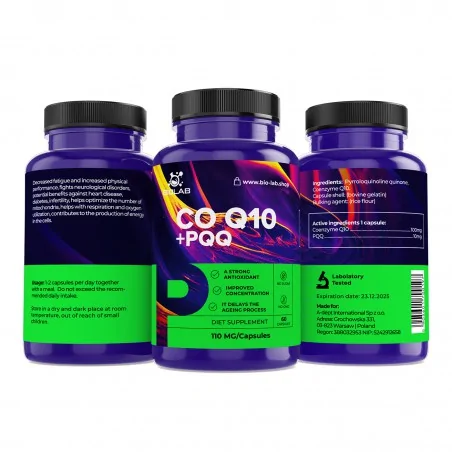
COENZYME Q10+PQQ
Product code:
Buy 3 and get 3% discount
Buy 5 and get 5% discount


Product code:
























COENZYME Q10+PQQ
PQQ was thought to be a type of vitamin, but after further research, scientists determined that while it had some vitamin-like properties, it was just a related nutrient. PQQ can act as a cofactor or enzyme enhancer in the REDOX (oxidation reduction) process. Due to its involvement in REDOX, PQQ offers some antioxidant effects. PQQ is most commonly foundin kiwi, green peppers and parsley, but many people choose to incorporate it into their diet through PQQ supplements. Perhaps most notable is the effect of PQQ on the mitochondria. Mitochondria provide our cells with energy (ATP) and regulate cell metabolism. The researchers looked closely at the effects of PPQ on mitochondria and discovered that PQQ can increase the number of mitochondria and even improve their performance. This is a big reason why PQQ is so beneficial.
1. The ultimate mitochondrial and energy supplement
2. Improves cognitive performance
3. Improves mood and mental health
4. Improves sleep
5. Increases wakefulness
Reduces inflammation and fights free radicals. It also improves various markers of oxidative stress in the urine, which is consistent with enhanced mitochondrial function. PQQ also protects neurons by preventing long-term over-activation of NMDA receptors, which causes excitotoxicity. Long-term, over-stimulation of neurons is associated with many neurodegenerative diseases. It also protects the brain from neurotoxicity caused by other powerful toxins, including mercury and oxidopamine, toxins that are suspected to cause Alzheimer's and Parkinson's disease, respectively.
The researchers compared PQQ with standard clinical treatment after a heart attack (metoprolol, beta-blocker). Both treatments reduced the size of the damaged areas and protected against heart muscle dysfunction. Only PQQ favorably reduced cell damage (lipid peroxidation) and the effects were more significant. These results led the researchers to conclude that "PQQ is superior to metoprolol in protecting mitochondria from oxidative ischemia/reperfusion damage."
Both PQQ and CoQ10 are related to the mitochondria, so don't they do the same thing? No, these are not the same measures, they both complement and reinforce each other, they have a multiplier effect.
Since CoQ10 is responsible for respiration and energy production in the mitochondria, healthy levels of CoQ10 can potentially contribute to several benefits:
1. Decreased fatigue and increased physical performance. Whether you are looking for a way to speed up your training or simply reduce daily fatigue, CoQ10 leads to a reduction in oxidative stress in your cells, which in turn improves mitochondrial function.
2. Combats neurological disorders. Mitochondria are the main source of energy for brain cells. As CoQ10 levels naturally decline with age, the risk of mitochondrial dysfunction increases. This can contribute to cell death, which in turn can cause Alzheimer's disease, Parkinson's disease, and other forms of dementia. Some research suggests that CoQ10 supplements may potentially inhibit or even slow the early progression of these disorders. CoQ10 may also improve cognition and memory in people without neurological disorders.
3. Potential Benefits Against Heart Disease, Diabetes, Infertility, and More. Because CoQ10 affects the body at the cellular level, it can be useful in treating, reversing, or preventing certain health problems. More research is needed, but initial trials show positive, promising results.

Your review appreciation cannot be sent
Report comment
Report sent
Your report cannot be sent
Write your review
Review sent
Your review cannot be sent
Customers who bought this product also bought:
REISHI 500mg
NAC 600mg/capsules
DSIP SPRAY 5mg
NO MERCY PRE-WORKOUT MIX...
RAD 140 TESTOLONE 30ml 600mg
BYE ACNE
Peptide consultations
BPC-157 ARG capsules 100mcg
Newsletter
SIGN UP AND STAY UP TO DATE!
We specialize in wholesale and retail supply of high quality peptides.
Category
Our company
Add to wishlist
((title))
Sign in
You need to be logged in to save products in your wishlist.